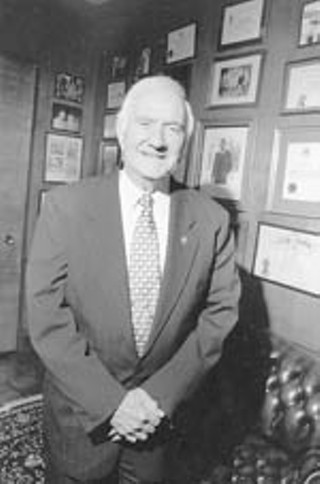Point Austin: Sharpening Teeth
Remedial dentistry in order for Police Monitor
By Michael King, Fri., Nov. 11, 2005

The Oct. 31 public hearing of the Citizens Review Panel of the Office of the Police Monitor was devoted primarily to the Daniel Rocha case – a police shooting death termed, in OPM parlance, a "critical incident." (See last week's "Point Austin.") But nearly an equal amount of discussion focused on the CRP and the OPM itself, how it might, in the words of retiring CRP chair and former mayor Roy Butler, "get some teeth." As things stand now, the monitor's office can hear citizen complaints, has access to the APD's Internal Affairs investigative files, and follows the departmental investigations to their conclusions. But the group can only issue "recommendations" to APD Chief Stan Knee, he is not bound by those recommendations, and the recommendations themselves become public only should the department issue some form of discipline to the officer involved (as has in fact occurred in the most high-profile cases of recent years).
These limitations were the subject of much lament in the public hearing (mostly off the dais, with the exception of Butler), the immediate and naive implication being that if only the OPM weren't handcuffed, harsh justice against offending officers would be swift and terrible. Butler himself is not nearly so absolute, saying he believes the current system is useful but that he is "frustrated" by the sense that people come to the panel in hope of specific recourse, only to be dismayed by the body's lack of official power. "People come to us thinking we're a Supreme Court," Butler told me, "and that we'll hear their complaint and take action. They're very disappointed to discover that's not within our authority. ... The panel needs more enforcement power."
Butler quickly adds that under state civil service law, the overall ability of officials to discipline police is quite circumscribed. "Not even the police chief can give more than a 15-day suspension without the agreement of the officer," he said. Beyond that, the matter often goes to an independent arbitration where, says Butler, many of the officers are reinstated after a hearing. Under those circumstances, he acknowledged, "I don't know that there's much more we can do. But people, when they come to us, they believe they're going to get some relief."
Knowledge Is Power
APD's critics point to Mike Sheffield, president of the Austin Police Association, as the main obstacle to stronger police oversight, because the current meet-and-confer contract with the APA (which runs to October 2008) sets the limits of the OPM, as specific exemptions to state civil service law. Butler says the union ought to "put up a statue" to Sheffield, because "he simply out-traded the city at negotiations." Sheffield himself, who with the panel took his share of public abuse at the Rocha hearing, is skeptical that the panel needs more power, at least until it uses more effectively the power that it already has. "They have all the ability they need to do their job," Sheffield argues, "if they have effective leadership." According to Sheffield, the monitor's office has been lax in educating the public about its own role as a watchdog, and more specifically has failed to do the kind of day-to-day education that would enable citizens to see that APD discipline of officers, on a regular basis, is not only effective but strict.
"The public generally only gets involved on these contentious, high-profile cases [like Rocha], which polarize the discussion," says Sheffield. "Overall the departmental discipline is very strict, even harsh – with officers being disciplined for even using rude language in traffic stops. If the monitor was doing his job, they would be gathering and disseminating statistics on all this discipline over time, and people would see that officers get hammered for every little thing." Sheffield says that the OPM was in theory modeled on the San Jose, Calif., civilian oversight process, which is known for maintaining and publicizing detailed statistical reports on police discipline, with the result of greater citizen satisfaction. "The Austin monitor should be doing the same thing, collecting all that information and telling people what's going on behind closed doors. They've got that power – but there's not a whole lot to show for it."
What You See ...
Sheffield's implicit criticism of current Monitor Ashton Cumberbatch (who steps down next month) and explicit criticism of City Manager Toby Futrell, who appointed Cumberbatch, doesn't raise the hackles of the always polite police monitor, who has grown accustomed to taking public shots from the other side because his office is more watchdog than attack dog. "People need to look at the whole process," he says patiently. "Before this office existed, there was no access to the IA system – it was completely closed. Now we have access, and that's extremely significant. They don't have to follow our recommendations, but if discipline is involved, those recommendations become available, and the public can see any discrepancy. That increased transparency is extremely important for public understanding."
Cumberbatch hopes for improvement of the system – for example, direct participation in the disciplinary deliberative process, from which his office is now excluded, and even a mediation procedure – but he notes that the public perception is currently somewhat distorted by its focus on headline-grabbing critical incidents. "We know that officers are now aware of our involvement and on a daily basis are more conscious of potentially inappropriate behavior, because they don't want to get caught up in this process with our oversight. I even had one officer who had been disciplined thank me," he added, "because it made him aware of things he shouldn't be doing, and that unchecked could lead to much worse behavior." Cumberbatch, along with other members of the panel I spoke to, agreed that while the process could always be improved, there's plenty to be said for the fledgling (four years old) OPM. "We have a lot further to go," said Cumberbatch, "but we have added value to this community."
Butler might well have been speaking for the whole group – and a good portion of the public, if not the department or the APA – when he repeated his lament: "I just wish we could put more teeth in it." ![]()
Got something to say on the subject? Send a letter to the editor.










